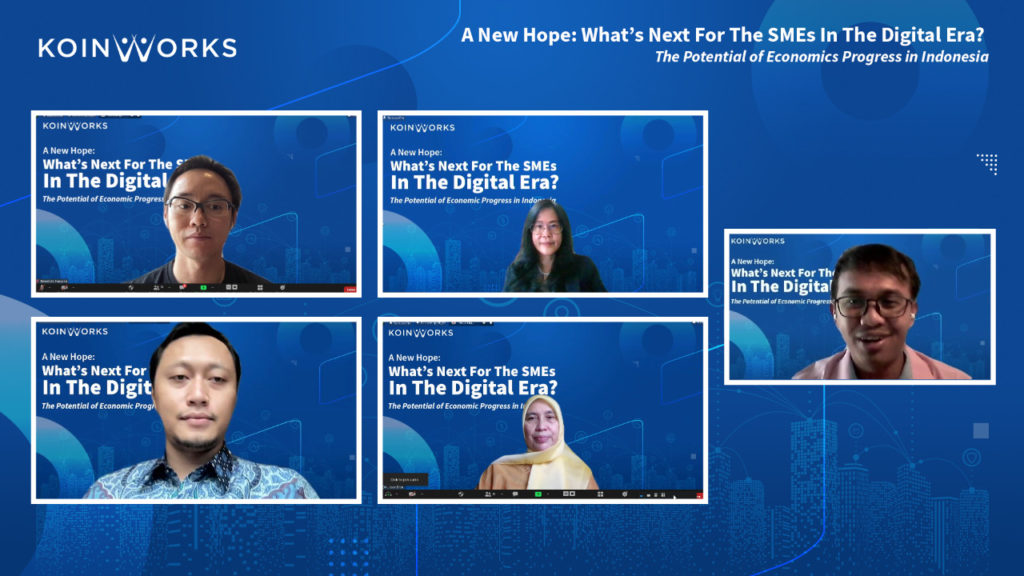Answering Business Challenges for MSME Actors in the Pandemic Era Through Digitalization
The digitization of MSMEs is even able to open the export faucet
The challenge of accelerating the growth of Indonesia's micro, small and medium enterprises (MSMEs) industry is increasingly dynamic. Especially in the midst of a situation full of economic uncertainty due to the pandemic, the strategy that is installed needs to be observed carefully so as not to make a wrong move. Its crucial contribution to the Indonesian economy has made the MSME industry worthy of special attention, both from regulators and private institutions from various industries. Digital transformation is considered to have an important role to play in driving this growth, in addition to the various challenges that will be faced during this pandemic period and beyond. So what will be the next chapter for the MSME industry players?
Digitization is still the key. Digital transformation for MSME actors, which has actually been echoed for years, is considered to need to be encouraged even more strongly. The benefits are believed not only to be able to maintain business, but also to open wide profitable opportunities in the midst of today's challenging times. In a virtual panel discussion titled “A new hope: What's next for the SME's in the digital era” initiated by KoinWorks, the use of digital channels is claimed not only to improve business performance, but also to open up export opportunities for MSME players.
In his presentation, Benedicto Haryono as CEO of KoinWorks revealed, as many as 5% of MSME players were able to export which was made possible through the support of eCommerce technology.
“Although we see that MSMEs still play a very small role for exports [from the government's target], we see that there is potential. With them to digital, they can access customer-based in international markets which previously might have been difficult to reach offline. Of course, with the eCommerce channel, there are already several MSME players who have succeeded in covering the Southeast Asian market," he said.
The findings related to the export value are also supported by the situation and trend of MSME businessmen who are currently starting to present their business in a 'hybrid' way, namely in offline and online channels. "Based on the research we did and also from public data, we see that there are as many as 48% of business actors who run their business in the offline as well as online realm, interestingly we also see that with more digital channels being used, business people are also able to increase their sales. significantly," added Benedicto.
Along with the increasing trend of digitization in the MSME industry, financial inclusion is also highlighted in line with this growth. As stated by Rose Dian Sundari, Deputy Director of Financial Inclusion Development at OJK, who said that digitalization is one of the things that is included as a strategy or agenda in the national financial inclusion acceleration strategy. In his presentation, it was stated that in the OJK's national financial inclusion strategy program, digitalization takes an important part, especially in terms of financial education, as well as intermediation facilities and financial distribution channels.
"In this case, OJK is directly involved in educational strategies, intermediation facilities and distribution channels, as well as consumer protection," he said.
In line with the OJK, the banking service institutions represented by BRI Agro also did not miss to welcome the positive about digitalization which encourages the advancement of the MSME industry. Digital-based bank financing is one of the important points in the design of BRI Agro's strategy in expanding access to funding for MSMEs. According to him, this strategy is realized by BRI Agro in the form of developing loan and savings products that are all fully integrated digitally.
Collaboration with financial technology (fintech) players is also carried out by BRI Agro. In one of the efforts to recover the MSME industry due to the pandemic, his party has collaborated with KoinWorks for a wider reach of funding than before.
"Through synergies and partnerships with fintech players, we can say that the distribution of our funding is very encouraging, so far there have been around 828 thousand potential affordable MSME players, and there have also been around 92 billion more funds channeled through our partnership with KoinWorks. We hope that in the future this collaboration can be sustainable, and of course can reach more MSME players so that we can have a positive impact on Indonesia's economic growth," said Bhimo Wikan Hantoro as Director of BRI Agro's Digital Business.
It seems that digitalization is still agreed to be the main key in the growth of the MSME industry which is increasingly massive in the future. From the virtual discussion panel organized by KoinWorks, it can be seen that the slick collaboration between regulators, financial institutions, and financial technology providers is able to accelerate MSME digital transformation efforts to face market challenges in the pandemic era and beyond. It is very interesting to see what kind of collaboration will happen in the future for the advancement of MSMEs and Indonesia's digital economy.
As the leading super financial app in Indonesia, KoinWorks has also released a report entitled “Digital SME Confidence Index 1st Half of 2021”. In the report, digital transformation succeeded in driving the index confidence and optimism from MSME actors in dealing with the pandemic through digital business. For insight For more details, you can download the report on the page this.
Sign up for our
newsletter

